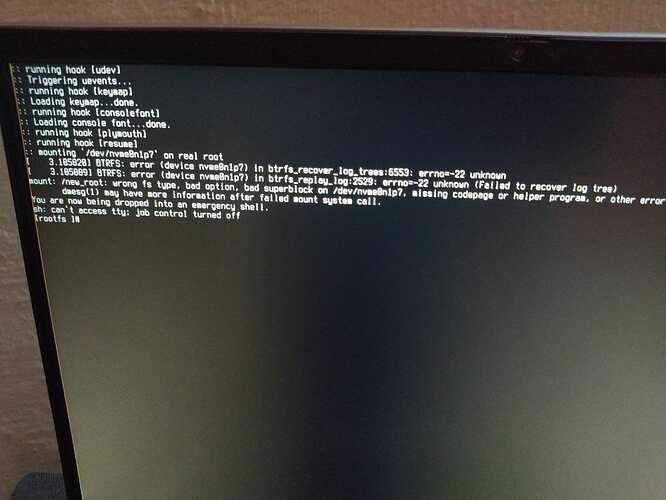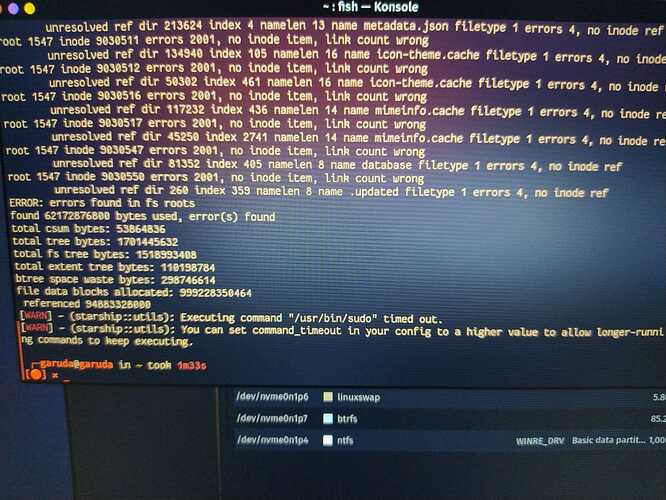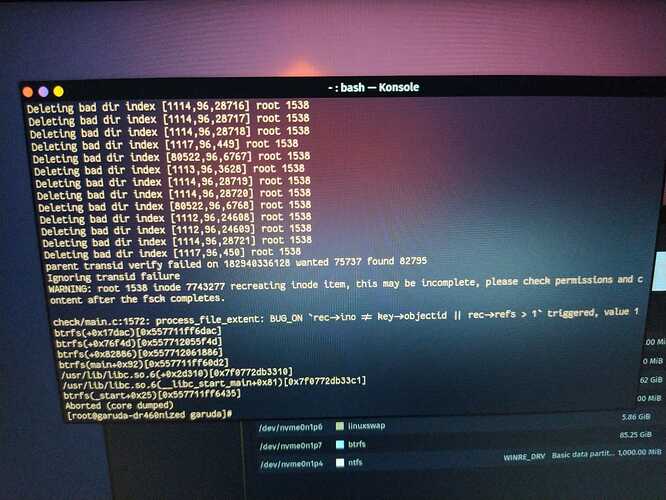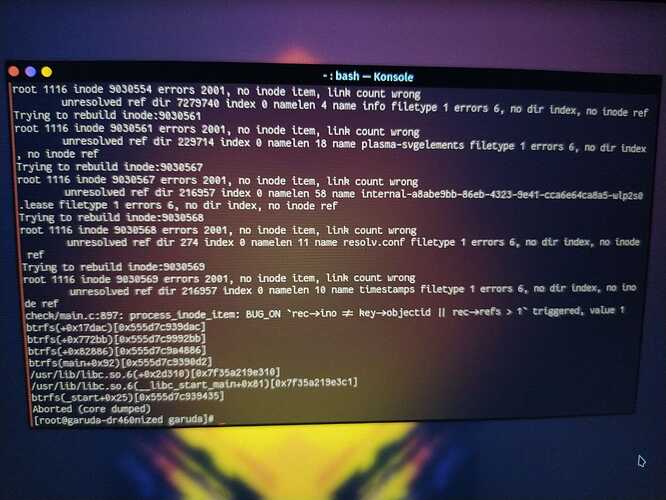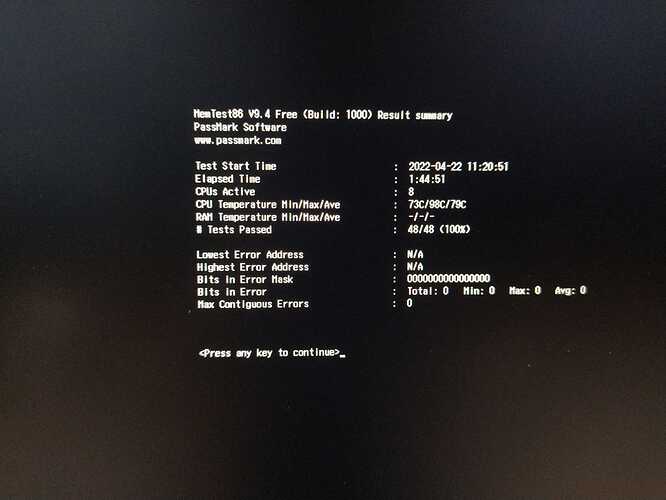garuda-inxi from a live session.
System:
Kernel: 5.16.16-zen1-1-zen arch: x86_64 bits: 64 compiler: gcc v: 11.2.0
parameters: BOOT_IMAGE=/boot/vmlinuz-x86_64 lang=en_US keytable=us tz=UTC
misobasedir=garuda misolabel=GARUDA_DR460NIZED_WHITETAILEDEAG quiet
systemd.show_status=1 driver=free nouveau.modeset=1 i915.modeset=1
radeon.modeset=1
Console: pty pts/0 wm: kwin_x11 DM: SDDM Distro: Garuda Linux
base: Arch Linux
Machine:
Type: Laptop System: LENOVO product: 81NB v: Lenovo IdeaPad S340-14API
serial: <filter> Chassis: type: 10 v: Lenovo IdeaPad S340-14API
serial: <filter>
Mobo: LENOVO model: LNVNB161216 v: SDK0Q55722 WIN serial: <filter>
UEFI: LENOVO v: AMCN29WW(V1.12) date: 01/27/2021
Battery:
ID-1: BAT1 charge: 53.0 Wh (100.0%) condition: 53.0/52.5 Wh (101.0%)
volts: 12.8 min: 11.3
model: 0x4C 0x47 0x43 0x00 0x32 0x30 0x 0x4C 0x31 0x38 0x33 0x50 0x5250
type: Li-ion serial: <filter> status: full cycles: 485
Device-1: hidpp_battery_0 model: Logitech Wireless Keyboard
serial: <filter> charge: 50% (should be ignored) rechargeable: yes
status: N/A
CPU:
Info: model: AMD Ryzen 5 3500U with Radeon Vega Mobile Gfx socket: FP5
bits: 64 type: MT MCP arch: Zen/Zen+ note: check family: 0x17 (23)
model-id: 0x18 (24) stepping: 1 microcode: 0x8108109
Topology: cpus: 1x cores: 4 tpc: 2 threads: 8 smt: enabled cache:
L1: 384 KiB desc: d-4x32 KiB; i-4x64 KiB L2: 2 MiB desc: 4x512 KiB
L3: 4 MiB desc: 1x4 MiB
Speed (MHz): avg: 1487 high: 2100 min/max: 1400/2100 boost: enabled
base/boost: 2100/3700 scaling: driver: acpi-cpufreq governor: schedutil
volts: 1.2 V ext-clock: 100 MHz cores: 1: 1400 2: 1400 3: 1400 4: 1400
5: 1400 6: 2100 7: 1400 8: 1400 bogomips: 33535
Flags: avx avx2 ht lm nx pae sse sse2 sse3 sse4_1 sse4_2 sse4a ssse3 svm
Vulnerabilities:
Type: itlb_multihit status: Not affected
Type: l1tf status: Not affected
Type: mds status: Not affected
Type: meltdown status: Not affected
Type: spec_store_bypass
mitigation: Speculative Store Bypass disabled via prctl
Type: spectre_v1
mitigation: usercopy/swapgs barriers and __user pointer sanitization
Type: spectre_v2
mitigation: Retpolines, IBPB: conditional, STIBP: disabled, RSB filling
Type: srbds status: Not affected
Type: tsx_async_abort status: Not affected
Graphics:
Device-1: AMD Picasso/Raven 2 [Radeon Vega Series / Radeon Mobile Series]
vendor: Lenovo driver: amdgpu v: kernel pcie: gen: 3 speed: 8 GT/s
lanes: 16 ports: active: eDP-1 empty: HDMI-A-1 bus-ID: 04:00.0
chip-ID: 1002:15d8 class-ID: 0300
Device-2: Syntek Integrated Camera type: USB driver: uvcvideo
bus-ID: 1-4:3 chip-ID: 174f:2426 class-ID: 0e02 serial: <filter>
Display: server: X.Org v: 1.21.1.3 compositor: kwin_x11 driver: X:
loaded: amdgpu unloaded: modesetting alternate: fbdev,vesa gpu: amdgpu
display-ID: :0 screens: 1
Screen-1: 0 s-res: 1920x1080 s-dpi: 96 s-size: 508x285mm (20.00x11.22")
s-diag: 582mm (22.93")
Monitor-1: eDP-1 mapped: eDP model: LG Display 0x05ec built: 2018
res: 1920x1080 hz: 60 dpi: 158 gamma: 1.2 size: 309x174mm (12.17x6.85")
diag: 355mm (14") ratio: 16:9 modes: max: 1920x1080 min: 640x480
OpenGL: renderer: AMD Radeon Vega 8 Graphics (RAVEN DRM 3.44.0
5.16.16-zen1-1-zen LLVM 13.0.1)
v: 4.6 Mesa 21.3.7 direct render: Yes
Audio:
Device-1: AMD Raven/Raven2/Fenghuang HDMI/DP Audio vendor: Lenovo
driver: snd_hda_intel v: kernel pcie: gen: 3 speed: 8 GT/s lanes: 16
bus-ID: 04:00.1 chip-ID: 1002:15de class-ID: 0403
Device-2: AMD ACP/ACP3X/ACP6x Audio Coprocessor vendor: Lenovo
driver: snd_pci_acp3x v: kernel
alternate: snd_rn_pci_acp3x,snd_pci_acp5x,snd_pci_acp6x pcie: gen: 3
speed: 8 GT/s lanes: 16 bus-ID: 04:00.5 chip-ID: 1022:15e2 class-ID: 0480
Device-3: AMD Family 17h/19h HD Audio vendor: Lenovo
driver: snd_hda_intel v: kernel pcie: gen: 3 speed: 8 GT/s lanes: 16
bus-ID: 04:00.6 chip-ID: 1022:15e3 class-ID: 0403
Sound Server-1: ALSA v: k5.16.16-zen1-1-zen running: yes
Sound Server-2: PulseAudio v: 15.0 running: no
Sound Server-3: PipeWire v: 0.3.48 running: yes
Network:
Device-1: Realtek RTL8822BE 802.11a/b/g/n/ac WiFi adapter
vendor: Lenovo ThinkPad E595 driver: rtw_8822be v: N/A
modules: rtw88_8822be pcie: gen: 1 speed: 2.5 GT/s lanes: 1 port: 2000
bus-ID: 02:00.0 chip-ID: 10ec:b822 class-ID: 0280
IF: wlp2s0 state: up mac: <filter>
Bluetooth:
Device-1: Realtek RTL8822BE Bluetooth 4.2 Adapter type: USB driver: btusb
v: 0.8 bus-ID: 3-2:2 chip-ID: 0bda:b023 class-ID: e001 serial: <filter>
Report: bt-adapter ID: hci0 rfk-id: 2 state: up address: <filter>
Drives:
Local Storage: total: 1.16 TiB used: 0 KiB (0.0%)
ID-1: /dev/nvme0n1 maj-min: 259:0 vendor: Lenovo O.E.M.
model: RPFTJ256PDD2MWX size: 238.47 GiB block-size: physical: 512 B
logical: 512 B speed: 15.8 Gb/s lanes: 2 type: SSD serial: <filter>
rev: 11.9 temp: 39.9 C scheme: GPT
SMART: yes health: PASSED on: 27d 14h cycles: 2,764
read-units: 46,946,318 [24.0 TB] written-units: 33,669,357 [17.2 TB]
ID-2: /dev/sda maj-min: 8:0 vendor: Seagate model: ST1000LM035-1RK172
family: Mobile HDD size: 931.51 GiB block-size: physical: 4096 B
logical: 512 B sata: 3.1 speed: 6.0 Gb/s type: HDD rpm: 5400
serial: <filter> rev: LFM1 temp: 36 C scheme: GPT
SMART: yes state: enabled health: PASSED on: 166d 20h cycles: 2588
Old-Age: g-sense error rate: 141 Pre-Fail: attribute: Spin_Retry_Count
value: 100 worst: 100 threshold: 97
ID-3: /dev/sdb maj-min: 8:16 type: USB vendor: SanDisk
model: Cruzer Glide size: 14.91 GiB block-size: physical: 512 B
logical: 512 B type: N/A serial: <filter> rev: 1.27 scheme: MBR
SMART Message: Unknown USB bridge. Flash drive/Unsupported enclosure?
Partition:
Message: No partition data found.
Swap:
Kernel: swappiness: 133 (default 60) cache-pressure: 100 (default)
ID-1: swap-1 type: zram size: 5.79 GiB used: 126 MiB (2.1%) priority: 100
dev: /dev/zram0
Sensors:
System Temperatures: cpu: N/A mobo: N/A gpu: amdgpu temp: 74.0 C
Fan Speeds (RPM): N/A
Info:
Processes: 260 Uptime: 1h 51m wakeups: 6 Memory: 5.79 GiB
used: 4.09 GiB (70.6%) Init: systemd v: 250 tool: systemctl Compilers:
gcc: 11.2.0 Packages: pacman: 1174 lib: 293 Shell: garuda-inxi (sudo)
default: Bash v: 5.1.16 running-in: konsole inxi: 3.3.14
Garuda (2.5.6-2):
System install date: 2022-04-23
Last full system update: 2022-04-23 ↻
Is partially upgraded: No
Relevant software: NetworkManager
Windows dual boot: Yes
Snapshots: Snapper
Failed units: snapper-cleanup.service```
Below are the complete details of what happened. I really need assistance and I need my data that are stored in the partition so I request help and clarity.
My linux btrfs partition had around 65gigs and I almost ran out of storage, I had 20 gigs of free space (above all linux partitions) , that I wanted to add and added it to the btrfs partition. My system was working fine, and after couple of shutting down and turning on(same day since didn't want to put it to sleep), kde popped up with "Couldn't write to .x" config-dotfiles, after a restart got the following error:
: :mounting '/dev/nvme0n1p7' on real root
[ 3.105820] BTRFS: error (device nvme0n1p7) in btrfs_recover_log_trees:6553: errorno=-22 unknown
[ 3.105889] BTRFS: error (device nvme0n1p7) in btrfs_reply_log:2529: error=-22 unknown (Failed to recover log tree)
mount: /new_root: wrong fs type, bad option, bad superblock on /dev/nvme0n1p7, missing codepage or helper program or other error.
dmesg(1) may have some more information after failed mount system call.
After this, booted into live usb and tried chroot & mount; neither worked, so asked help in the garuda TG chat as emergency
One of the members (Official group maintainer) replied
I got this error
It aborted and I got this output:
Was told to run again and similar thing happened
Some were suggesting to check ram(due to getting aborted), used memtestx86 and had no errors
I tried checking ssd with smartmontools this is what i get.
$ sudo smartctl --health /dev/nvme0n1
smartctl 7.3 2022-02-28 r5338 [x86_64-linux-5.16.16-zen1-1-zen] (local build)
Copyright (C) 2002-22, Bruce Allen, Christian Franke, www.smartmontools.org
=== START OF SMART DATA SECTION ===
SMART overall-health self-assessment test result: PASSED
$ sudo smartctl -d ata -H /dev/nvme0n1
smartctl 7.3 2022-02-28 r5338 [x86_64-linux-5.16.16-zen1-1-zen] (local build)
Copyright (C) 2002-22, Bruce Allen, Christian Franke, www.smartmontools.org
Read Device Identity failed: Inappropriate ioctl for device
If this is a USB connected device, look at the various --device=TYPE variants
A mandatory SMART command failed: exiting. To continue, add one or more '-T permissive' options.
$ sudo smartctl -t long /dev/nvme0n1
smartctl 7.3 2022-02-28 r5338 [x86_64-linux-5.16.16-zen1-1-zen] (local build)
Copyright (C) 2002-22, Bruce Allen, Christian Franke, www.smartmontools.org
NVMe device successfully opened
Use 'smartctl -a' (or '-x') to print SMART (and more) information
$ sudo smartctl -l selftest /dev/nvme0n1
smartctl 7.3 2022-02-28 r5338 [x86_64-linux-5.16.16-zen1-1-zen] (local build)
Copyright (C) 2002-22, Bruce Allen, Christian Franke, www.smartmontools.org
NVMe device successfully opened
Use 'smartctl -a' (or '-x') to print SMART (and more) information
$ sudo smartctl -a /dev/nvme0n1
smartctl 7.3 2022-02-28 r5338 [x86_64-linux-5.16.16-zen1-1-zen] (local build)
Copyright (C) 2002-22, Bruce Allen, Christian Franke, www.smartmontools.org
=== START OF INFORMATION SECTION ===
Model Number: RPFTJ256PDD2MWX
Serial Number: SS0R27339Z1CD04311J3
Firmware Version: 11.9
PCI Vendor/Subsystem ID: 0x1cc4
IEEE OUI Identifier: 0x000000
Total NVM Capacity: 256,060,514,304 [256 GB]
Unallocated NVM Capacity: 0
Controller ID: 0
NVMe Version: 1.2
Number of Namespaces: 1
Namespace 1 Size/Capacity: 256,060,514,304 [256 GB]
Namespace 1 Formatted LBA Size: 512
Local Time is: Sat Apr 23 16:53:04 2022 UTC
Firmware Updates (0x12): 1 Slot, no Reset required
Optional Admin Commands (0x0007): Security Format Frmw_DL
Optional NVM Commands (0x001e): Wr_Unc DS_Mngmt Wr_Zero Sav/Sel_Feat
Log Page Attributes (0x04): Ext_Get_Lg
Maximum Data Transfer Size: 512 Pages
Warning Comp. Temp. Threshold: 90 Celsius
Critical Comp. Temp. Threshold: 94 Celsius
Supported Power States
St Op Max Active Idle RL RT WL WT Ent_Lat Ex_Lat
0 + 3.00W - - 0 0 0 0 0 0
1 + 2.00W - - 1 1 1 1 0 0
2 + 2.00W - - 2 2 2 2 0 0
3 - 0.1000W - - 3 3 3 3 1000 1000
4 - 0.0050W - - 4 4 4 4 1000 5000
Supported LBA Sizes (NSID 0x1)
Id Fmt Data Metadt Rel_Perf
0 + 512 0 1
1 - 4096 0 0
=== START OF SMART DATA SECTION ===
SMART overall-health self-assessment test result: PASSED
SMART/Health Information (NVMe Log 0x02)
Critical Warning: 0x00
Temperature: 40 Celsius
Available Spare: 100%
Available Spare Threshold: 50%
Percentage Used: 11%
Data Units Read: 46,946,314 [24.0 TB]
Data Units Written: 33,669,357 [17.2 TB]
Host Read Commands: 433,969,327
Host Write Commands: 395,607,401
Controller Busy Time: 651
Power Cycles: 2,764
Power On Hours: 662
Unsafe Shutdowns: 249
Media and Data Integrity Errors: 0
Error Information Log Entries: 354
Warning Comp. Temperature Time: 0
Critical Comp. Temperature Time: 0
Temperature Sensor 2: 40 Celsius
Error Information (NVMe Log 0x01, 16 of 16 entries)
Num ErrCount SQId CmdId Status PELoc LBA NSID VS
0 354 0 0x101d 0x0005 - 6 0 -
1 353 0 0x1009 0x0005 - 6 0 -
2 352 0 0x100d 0x0005 - 6 0 -
3 350 0 0x0015 0x0005 - 6 0 -
4 349 0 0x0005 0x0005 - 6 0 -
5 348 0 0x0019 0x0005 - 6 0 -
6 347 0 0x100d 0x0005 - 6 0 -
7 346 0 0x0009 0x0005 - 6 0 -
8 345 0 0x0019 0x0005 - 6 0 -
9 344 0 0x0001 0x0005 - 6 0 -
10 343 0 0x0011 0x0005 - 6 0 -
11 342 0 0x0015 0x0005 - 6 0 -
12 341 0 0x1011 0x0005 - 6 0 -
13 340 0 0x0005 0x0005 - 6 0 -
14 339 0 0x0001 0x0005 - 6 0 -
15 335 0 0x0009 0x0005 - 6 0 -
I've not booted into the garuda system since.
